I have a JSON field which have the following data:
[{"low": 57.07, "rsi": 0.0, "date": 1675935000000, "high": 57.07, "open": 57.07, "close": 57.07, "ema_7": 0.0, "ema_21": 0.0, "symbol": "ACPL", "volume": 0, "SUPERT_10_1_0": 0.0, "SUPERTd_10_1_0": 1, "SUPERTl_10_1_0": 0.0, "SUPERTs_10_1_0": 0.0}, {"low": 57.0, "rsi": 0.0, "date": 1675935900000, "high": 58.49, "open": 57.07, "close": 58.4, "ema_7": 0.0, "ema_21": 0.0, "symbol": "ACPL", "volume": 2500, "SUPERT_10_1_0": 0.0, "SUPERTd_10_1_0": 1, "SUPERTl_10_1_0": 0.0, "SUPERTs_10_1_0": 0.0}, {"low": 57.7, "rsi": 0.0, "date": 1675936800000, "high": 58.5, "open": 58.4, "close": 58.49, "ema_7": 0.0, "ema_21": 0.0, "symbol": "ACPL", "volume": 27000, "SUPERT_10_1_0": 0.0, "SUPERTd_10_1_0": 1, "SUPERTl_10_1_0": 0.0, "SUPERTs_10_1_0": 0.0}, {"low": 58.15, "rsi": 0.0, "date": 1675937700000, "high": 59.5, "open": 58.5, "close": 59.5, "ema_7": 0.0, "ema_21": 0.0, "symbol": "ACPL", "volume": 41000, "SUPERT_10_1_0": 0.0, "SUPERTd_10_1_0": 1, "SUPERTl_10_1_0": 0.0, "SUPERTs_10_1_0": 0.0}, {"low": 59.0, "rsi": 0.0, "date": 1675938600000, "high": 59.5, "open": 59.5, "close": 59.0, "ema_7": 0.0, "ema_21": 0.0, "symbol": "ACPL", "volume": 2500, "SUPERT_10_1_0": 0.0, "SUPERTd_10_1_0": 1, "SUPERTl_10_1_0": 0.0, "SUPERTs_10_1_0": 0.0}]
The following query perfectly works for me:
SELECT indicators_15.symbol,indicators_15.open,indicators_15.close
FROM indicators_15,
JSON_TABLE(data, '$[*]' COLUMNS (
close DOUBLE PATH '$.close',
open DOUBLE PATH '$.open')
) indicators_15;
but my Hosting, Namecheap is using an older version of MariaDB hence it is failing. How can I come up with an equivalent non-JSON_TABLE version?
Below is the desired output:
